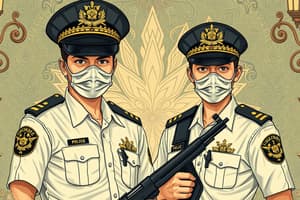Podcast
Questions and Answers
What is the criminal justice system?
What is the criminal justice system?
It is the machinery of the State in the prevention and control of crime.
What is the legal definition of a criminal?
What is the legal definition of a criminal?
A person who violates the law or has been convicted of a crime.
The phrase ‘Nullum crimen, nulla poena sine lege’ means there is no crime when there is no law punishing it. ______ or False?
The phrase ‘Nullum crimen, nulla poena sine lege’ means there is no crime when there is no law punishing it. ______ or False?
True
What does justice mean in the context of criminal law?
What does justice mean in the context of criminal law?
Match the following models of criminal justice to their descriptions:
Match the following models of criminal justice to their descriptions:
What is the focus of the Due Process Model?
What is the focus of the Due Process Model?
What does the Due Process Clause state?
What does the Due Process Clause state?
Which of the following is NOT a source of criminal law?
Which of the following is NOT a source of criminal law?
What does the principle of territoriality imply in criminal law?
What does the principle of territoriality imply in criminal law?
What is a characteristic of criminal law regarding generality?
What is a characteristic of criminal law regarding generality?
Study Notes
Criminal Justice System
- The Criminal Justice System in the Philippines encompasses the agencies, processes, and personnel tasked with preventing, controlling, and addressing crime.
- This includes law enforcement, prosecution, courts, corrections, and the community’s role in crime prevention.
Crime
- An illegal act or omission that is punishable by law.
- The principle of "Nullum crimen, nulla poena sine lege" applies, meaning there is no crime without a law defining and punishing it.
Criminal
- Someone who commits a crime.
- Legally, a criminal is a person who has been found guilty of a crime by a court of law and has been sentenced.
Justice
- Fairness and impartiality in treatment and consideration of all individuals.
- The theory of justice emphasizes equal rights to basic liberties and equal opportunities.
Models of Criminal Justice
Due Process Model
- Emphasizes the rights of the defendant, who is presumed innocent until proven guilty.
- Focuses on individualizing rehabilitation programs for those found guilty.
Origin of Due Process
- Found in Article III, Section 1 of the 1987 Philippine Constitution: "No person shall be deprived of life, liberty, and property without due process of law, nor shall any person be denied the equal protection of the laws."
Aspects of Due Process
- Substantive Due Process: The law must be fair and reasonable in its interference with a person's rights to life, liberty, or property.
- Procedural Due Process: Regular procedures must be followed before someone can be deprived of their life, liberty, or property.
Crime Control Model
- Emphasizes the arrest and punishment of offenders to deter crime and repress criminal behavior.
- The accused is often presumed guilty when police make an arrest and a prosecutor files charges.
Criminal Law
- This branch of public law defines crimes, analyzes their nature, and outlines their punishments.
Sources of Criminal Law
- Codigo Penal de España (Spanish Penal Code)
- Revised Penal Code (Book 1 and 2)
- Special Penal Laws
- City/Municipal Ordinances
Characteristics of Criminal Law
Generality
- Applies to all individuals living in the Philippines, regardless of age, sex, or nationality.
Exceptions to Generality
- Treaties and treaty stipulations.
- Principles of public international law, exempting:
- Sovereigns or heads of state.
- Ambassadors, ministers plenipotentiary, ministers resident, and chargés d'affaires.
- Laws of preferential application (RA 75):
- Prohibits the prosecution, arrest, and detention of ambassadors, public ministers, and their domestic servants.
Territoriality
- Generally applicable only within the Philippine Territory.
Exceptions to Territoriality
- Offenses committed on Philippine ships or aircraft.
- Forgery or counterfeiting Philippine currency.
- Introducing counterfeit Philippine obligations or securities.
- Offenses committed by public officers or employees while abroad.
Studying That Suits You
Use AI to generate personalized quizzes and flashcards to suit your learning preferences.
Related Documents
Description
Explore the structure and functions of the Criminal Justice System in the Philippines. This quiz covers key concepts such as crime definitions, the role of criminals, principles of justice, and different models of criminal justice. Test your knowledge on how these elements work together to maintain law and order.




